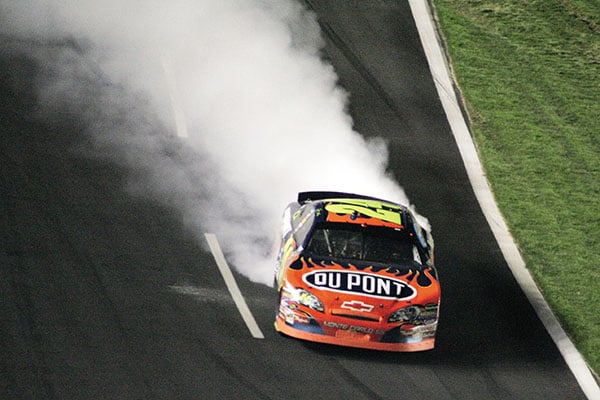Jeff Gordon: Racing away to glory
Meet the new, Zen Jeff Gordon, a Nascar racing legend who now balances a happy home life with his (still) burning desire to win


Jeff Gordon is ecstatic, bounding down the stairs of his soaring Charlotte, North Carolina, home, relaying details of how he just conquered his most challenging—and frequently travelled—road course. Clad in jeans and a T-shirt, he gives his wife, former model Ingrid Vandebosch, a high five, rattling off the details of his win, down to the corners he skimmed and the passes he executed.
After this victory dance, he turns to me, shakes my hand with a steady grip that belies his trim, 5’7” frame and then rehashes his feat. It turns out that the 42-year-old three-time Daytona 500 champion, one of the most famous race car drivers in history, has finally figured out… the carpool route to kindergarten.
“We’ve been trying to get better at it,” says Gordon, who alternates with Vandebosch on the morning run in the family Suburban. “There are a few little back roads.”
We’re standing in the sunlit living room of Gordon’s house in Charlotte’s South Park neighbourhood in our stocking feet (“Shoes off, please!”). His home is casually modern, the decor—monochromatic tan-and-taupe furniture and floor-to-ceiling windows—courtesy of Pembrooke & Ives. The walls are adorned with works by Alison Van Pelt and Matisse. Photographer Peter Beard is another favourite. There’s a billiards room, a bar and a well-stocked wine cellar, which hosts, of course, bottles from his own label. Outside, beside the 30-foot pool, sits a thing of childhood fantasy: A nearly life-size dollhouse. Gordon and Vandebosch with son, Leo
Gordon and Vandebosch with son, Leo
Gordon’s nanny has just left to pick up his 3-year-old son, Leo, from day care. Big sister Ella, 6, will be home soon. Vandebosch, a stylish 42-year-old brunette from Belgium (by way of Paris and New York), checks on the chef in the couple’s cavernous kitchen, where he’s casually mixing greens for lunch.
In the middle of this idyllic scene is Gordon. He seems, at the moment, to be a very content stay-at-home dad—albeit one who happens to be a NASCAR legend whose 87 wins are the most of any driver in the sport’s modern era.
But he’s also a man who has failed in recent years to achieve the extremely high standard of success that he set for himself earlier in his career. In the last decade Gordon has gone from the very best—he was the first NASCAR driver to reach $100 million in career earnings—to one of a dozen or so drivers who qualify as “very good”. It’s a spot many other racers would happily trade for. But for Gordon, it’s not enough.
This racing year serves as a microcosm of his up-and-down decade. He started the season with a crash at the Sprint Unlimited race in Daytona Beach, Florida, then followed that with a disappointing 20th-place finish at the Daytona 500 after leading the sport’s premier race for 31 laps. Subsequent top 10 finishes (at Phoenix, Martinsville and Bojangles’ Southern 500) were offset by middling runs and five more crashes.
A recent seventh-place finish at Bristol Motor Speedway and a controversial placement in the season-ending Chase for the Sprint Cup have improved the mood somewhat at Hendrick Motorsports, the racing group he partially owns. But Gordon hasn’t won a race in nearly a year.
And yet he seems somewhat at peace with it all. Family life, outside interests, age and perspective have all made him the most Zen person on the planet whose day job entails hitting 200 mph. “Things always move pretty fast in our world,” says five-time Cup Series champion Jimmie Johnson. “Jeff ’s able to stay calm.” Gordon’s candid about his lack of big success lately: He’s less self-assured than he was in, say, 1999, when at age 28 he won Daytona for the second time, one of seven wins that year, or in 2001, when he won his fourth NASCAR series cup. Belief in his ability now waxes and wanes. “The last couple of years, as I’m getting older and haven’t had as much success, it’s easy to start questioning and doubting,” Gordon says. “But then I have a good race, and I think, ‘Oh, okay, I can do this,’ and that builds my confidence back up.”
When he loses, Vandebosch says, “I just let him be. Before I would be like, ‘Why did this happen?’&thinsp”
“She gets more upset than I do!” Gordon interjects.
The kids, he says, provide the most perspective. “They certainly don’t care [about wins and losses]. And you’re going to lose a lot more races than you’re going to win.” A family man’s family photos
A family man’s family photos
That said, Gordon is adamant that he’s as competitive now as he ever has been. “I’m just trying to figure out how to go faster, how to beat everyone else,” he says. He just has to do it now with the matured brain of a father of two.
That drive to compete—and win—is what propelled him to the top of the sport in the first place. Gordon was born in Vallejo, California, and raised in Pittsboro, Indiana. His parents divorced when he was six months old. When his mother remarried, his new stepfather, John Bickford, decided he needed to do something to bond with the boy. So he started taking him to the racetrack. Gordon was hooked. He started racing when he was 5 years old. “Right away I knew I wanted to win,” he says.
His stepfather says that some of Gordon’s development stemmed from his neighbourhood. Gordon often played on the street with kids who were three or four years older—and physically bigger—than he. “It was always keep-up with the older kids. They were on a bicycle, he had to be on a bicycle,” Bickford says. “He had the absolute ability to concentrate on whatever he was doing and try to be better.”
That competitive streak was mixed with a substantial dose of humility. Bickford says Gordon, as a kid, would become shy when he started winning everything: Neighbourhood bike races, ball games, go-kart races on the track. He still carries that humility with him. (He has only one wall in Charlotte devoted to maybe a dozen trophies “At home I like to be away from racing,” he ex- plains.) And when I ask him to divulge the secret of his success, he simply says: “If everyone drove as much as I do, they’d drive as well as I do, too.”
“That’s it?” I reply.
“I’ve always just thought my car was really good and I’m just doing my part,” he says. “I’ve been with good teams, good cars, and I’ve done what I needed to help to win.”
I’m not willing to take that for an answer, either. I press him again. Finally, he makes a concession of sorts: “Well, I have pretty good hand-eye co-ordination.”
Whatever the secret, it has led to those 87 wins, the three Daytona 500 victories, the four NASCAR season titles and now well over $100 million in earnings from the track. Add to that the $5.5 million Gordon made last year alone in endorsements from the likes of Axalta and DVX Eyewear, his wines and his ownership stake in Jimmie Johnson’s number 48 car, which captured five straight Cup championships between 2006 and 2010. Gordon’s workplace in miniature
Gordon’s workplace in miniature
Says Gordon about racing: “It’s fun when you’re successful.” Now? Maybe not so much. Vandebosch offers him her take on his present-day track status, edged with a bit of humour that has to sting: “It seems like you used to start with not a good car and work up. Now you start with a good car and go backwards.”
Being the centre of NASCAR’s biggest controversy of the year probably hasn’t helped matters. In an unprecedented move, NASCAR chairman Brian France recently awarded Gordon the 13th slot in the final segment of the Sprint Cup Series. (This is significant because traditionally this part of the series—often called the Chase for the Sprint Cup—allows only 12 drivers.) Gordon’s inconsistent season had left him on the qualifying bubble, but at the Richmond International Raceway in early September, he looked poised to capture a spot with fewer than 10 laps remaining. Then drivers from several rival teams intentionally slowed down or took unnecessary pit stops, helping their teammates to qualify for the Chase while knocking Gordon out of contention.
Days later, France penalised one team, put two others on probation and added Gordon to the series. Though France maintained it was the right thing to do, the move was seen in some circles as playing favourites with a big-name driver. (Early in his career, Gordon was also a lightning rod, cast in many fans’ minds as the more polished foil to the late Dale Earnhardt. Many a pickup truck sported a sticker of the mischievous boy from the Calvin and Hobbes comic strip relieving himself on Gordon’s number 24.) Gordon took advantage of the ruling almost immediately, finishing sixth at the Geico 400 the next week and climbing to number seven in the standings—his highest ranking of the season.
Later in the afternoon, Gordon and I sit out back by the pool before lunch. He has poured two glasses of a 2007 Ella Sofia Carneros Chardon- nay, a wine from his eponymous label. He takes a sip and leans back in his lawn chair. The sky is overcast in that heavy southern way, making the lawn look double-saturated in green. Ella is playing nearby with a stuffed bunny. Vandebosch is inside reading to Leo. I ask Gordon about his wife. The two seem very much connected. Earlier, I had noticed how he constantly had his arm around her, seemingly wanting to keep her close.
He shares the fact that when they first met, Gordon was entirely hands-off, for a reason. His divorce from his first wife, Brooke Sealey—which featured multiple lawsuits and much tabloid coverage—was not quite final when Gordon attended a dinner party in the Hamptons in 2002. Vandebosch was there with a male friend.
Gordon approached the man and asked if they were dating. When he said no, Gordon asked to be seated next to Vandebosch. He was immediately smitten but was careful to not be near her when any photographers were present. “People were taking pictures at the party, and he said, ‘No one can take our picture,’” Vandebosch says. “And I was wondering, ‘What’s his deal?’”
She was intrigued. They started dating some months later and got married in 2006. Vandebosch tries to attend all his races but never wants to be away from the kids too long. She frequently takes a helicopter to the track for a race, then leaves early the next morning. Exulting after his 1997 Daytona 500 victory
Exulting after his 1997 Daytona 500 victory
Vandebosch has brought out a side of Gordon that’s somewhat unexpected among stock-car-racing fans. She has spurred his interest in art and wine and lying on the beach in St Barths. The couple work together on his various phi- lanthropies—the Jeff Gordon Children’s Foundation, Athletes for Hope and the Jeff Gordon Children’s Hospital. They have an apartment in New York City and some land in Colorado. Of his career and its attendant spoils, Gor- don says, “It’s gone extremely well, better than I ever thought it would go.”
And yet there’s still that urge to recapture his glory on the track, to find some functional balance between his passion for work and his home life. Gordon says the dichotomy is simple to explain. “Outside the car I’m pretty calm. But inside the car I’m driven by the competition, by trying to make the car go faster than everyone else’s, trying to pass that car in front of me.”
These days, of course, the car in front of him is sometimes on his carpool route.
First Published: Sep 02, 2014, 06:49
Subscribe Now(This story appears in the Feb 05, 2010 issue of Forbes India. To visit our Archives, Click here.)